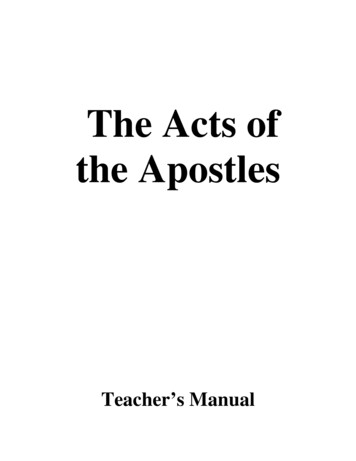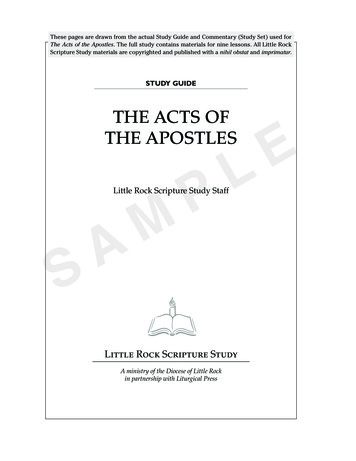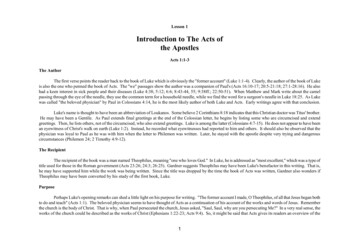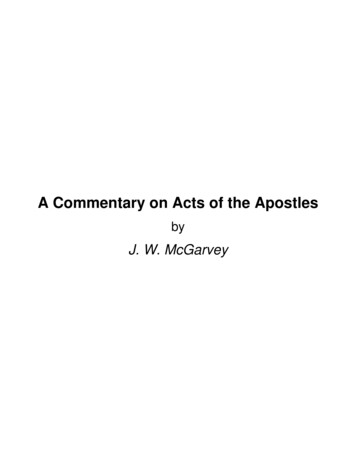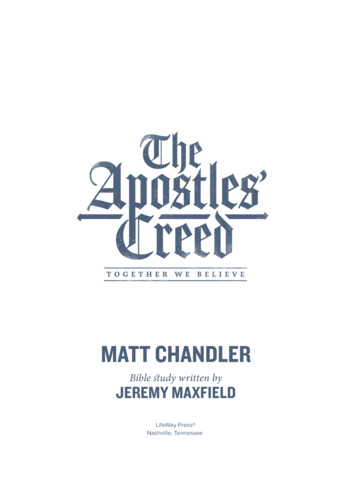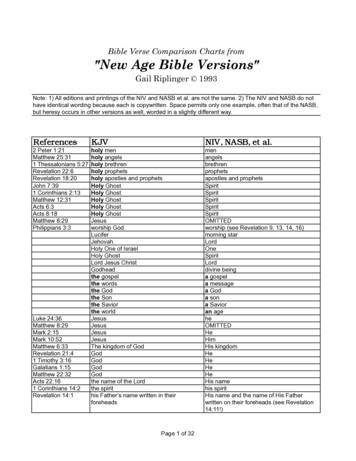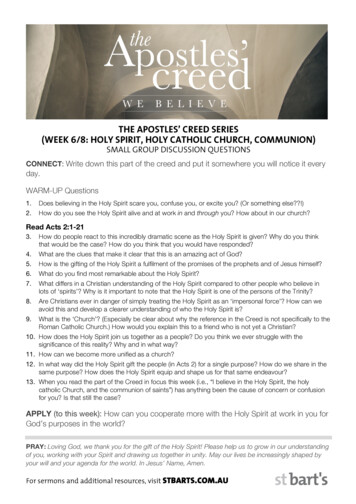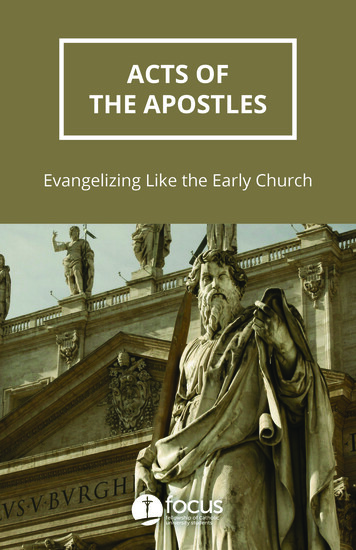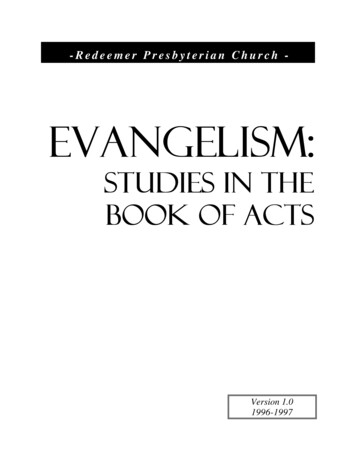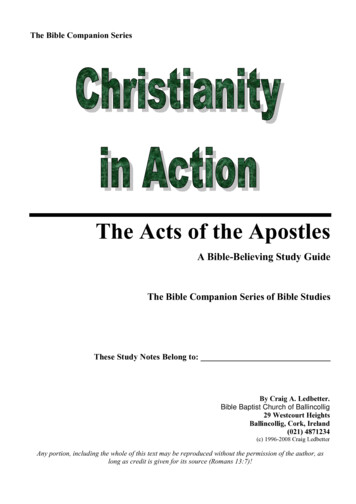
Transcription
The Bible Companion SeriesThe Acts of the ApostlesA Bible-Believing Study GuideThe Bible Companion Series of Bible StudiesThese Study Notes Belong to:By Craig A. Ledbetter.Bible Baptist Church of Ballincollig29 Westcourt HeightsBallincollig, Cork, Ireland(021) 4871234(c) 1996-2008 Craig LedbetterAny portion, including the whole of this text may be reproduced without the permission of the author, aslong as credit is given for its source (Romans 13:7)!
The Acts of the ApostlesStudy Introduction -TABLE OF CONTENTSStudy of the Book of ActsSTUDY INTRODUCTION . 4CHAPTER ONE. 6THE CHURCH COMMISSIONED . 6CHAPTER TWO. 9THE CHURCH EMPOWERED . 9CHAPTER THREE. 14CHRISTIANITY MEETS THE NEED . 14CHAPTER FOUR . 17HOW TO STAND-UP FOR CHRIST . 17CHAPTER FIVE. 19STAYING TRUE!. 19CHAPTER SIX . 22DELEGATING THE WORK . 22CHAPTER SEVEN . 25LEARNING THE LESSONS OF HISTORY . 25CHAPTER EIGHT . 29THE CHURCH E XPANDING. 29CHAPTER NINE . 33THE CONVERSION OF SAUL . 33CHAPTER TEN. 36CORNELIUS MEETS CHRIST . 36CHAPTER ELEVEN . 39THE FIRST “CHRISTIANS” . 39CHAPTER TWELVE . 42THE CHURCH LEARNS TO PRAY . 42FINAL EXAM . 45CHAPTERS 1-12 . 45CHAPTER THIRTEEN. 48GOD'S CALL TO SERVICE . 48CHAPTER FOURTEEN. 51SUFFERING WHILE SERVING . 51CHAPTER FIFTEEN . 54SETTLING NEW TESTAMENT SALVATION . 54CHAPTER 16. 57THE SECOND MISSIONARY JOURNEY . 57CHAPTER 17. 60SEARCHING THE SCRIPTURES . 60CHAPTER 18. 63SPIRITUAL OVERDRIVE . 63The Bible Companion Series 2
The Acts of the ApostlesStudy Introduction -CHAPTER 19. 66THE SECURING OF EPHESUS . 66CHAPTER 20. 73SAYING FAREWELL . 73CHAPTER 21. 77SAVING THE BEST FOR LAST . 77CHAPTER 22. 81SPREADING THE GOSPEL BY TESTIMONY . 81CHAPTER 23. 83SPREADING THE GOSPEL BY TESTIMONY . 83CHAPTERS 24. 85SAVOURING E VERY MOMENT . 85CHAPTERS 25. 87TO THE UTTERMOST. 87CHAPTERS 26. 89ALMOST PERSUADED! . 89CHAPTER 27. 92HOW TO HANDLE THE STORMS OF LIFE . 92CHAPTER 28. 94PAUL'S FINAL JOURNEY . 94A Note Concerning the Cork Bible InstituteThis study course is intended to be used in conjunction with the Cork Bible Institute and contains a Final Exam that can beapplied towards credit in the Institute. If you want your participation in this course to be part of an overall courseaccreditation, please inform Pastor Ledbetter and he will make sure your records are retained. Your attendance will berecorded, and there will be a class project for you to complete by the end of the ten week course.Class Project:To pass this course, you will need to complete two reports:1) A Report giving a brief description of every person in the Book of Acts, and2) A basic outline, briefly describing every chapter of the Book.The Bible Companion Series 3
The Acts of the ApostlesStudy Introduction -The Acts of the ApostlesStudy IntroductionI.Preliminary InformationA. The Title of the Book - The of the Apostles1.2.3.Describes An Account - Not primarily doctrinal in nature, but a record of the lives of real people wholived out what they believed, under real circumstances.Describes An Account - Actual names and places of verifiable facts. Not like Joseph Smith's"Book of Mormon" with is non-historical!!! This Book in type will match the character of the Book of Joshua,which too is an historical account of God's people possessing their inheritance.Describes An Account - The book is written in the Present Tense. In other words, these acts areon-going in the lives of Christians today! Christianity did not end at the close of the 28th chapter! Christianitycontinues to spread, and build upon the foundation laid here in this Book (Eph 2:19-22)B. The Author: (Luke 1:1; Acts 1:10)1.2.3.The ultimate Author is (2 Tim 2:15)As far as the human “ ” was, compare Scripture with Scripture Acts 1:1,2 with Luke 1:1,2.Luke, the beloved physician (Col 4:14), was a Jew, not a Gentile as many believe. Reason: because Romans 3:2states that the “oracles of God” (Scriptures) are given to the , and NO Gentile is used to write any JewishScripture!C. The Date of Its Writing: About A.D.1.2.Acts 28 records that the Apostle Paul was not dead at the completion of the Book of the Acts, so it has to bedated before his death which was in 65 ADIt is well known that Jerusalem was destroyed in 70 AD, and the Acts does not record that either, so it waswritten before that event as well.D. The Intended Audience 1.2.O Theophilus! of God! The Bible has always been written primarily for God's people, and not for theatheist or agnostic! It is written from the standpoint of the believer with few exceptions which are directed atthe skeptic. Did you ever notice that the Bible never attempts to prove the existence of God?Did you notice that Luke is not attempting to re-write, or update his former treatise, but rather continuing on inits account of God's hand in their lives. Luke’s first treatise was written under the inspiration of God (2 Tim3:16). Luke knew that no one could improve God's inspiration!E. Its Importance and Significance1.2.3.The Book of Acts puts “ ” to faith. God’s truth changes a life (2 Cor 5:17), not just a mind, or even just aheart, and Acts shows how the lives of people all over the world were changed by the preaching of the gospel.Acts is the of the Gospel!The Book of Acts records what it took the apostles and early disciples to lay the foundation for the rest of us toget saved.It places in the hand of the Christian a verifiable record of the events and truths of Christianity so that they mayknow with “ ” (Luke 1:4) that it is of God, and God alone!F. The Theme - always Jesus Christ (1:1; Acts 28:31)1.2.The Book of Luke covered the life of Jesus Christ, His "passion," and his resurrection.The Book of Acts will cover the life that Jesus Christ lives his disciples until His return for them inthe clouds!G. Its Placement in the Bible1.2.Acts is a continuation of a former (in-depth discourse) - The Gospel According to Luke.Acts provides a practical connection with the doctrinal Books that follow it. The doctrinal Books (Romans, 1& 2 Corinthians, Galatians, etc.), are principles, and statements that need lives attached to them before they canbe transferred to another life.II. Our Approach to the Study of the BibleA. We take the Bible as primarily and authoritative (John 17:17)B. We prefer to study the Bible in an outline form - identifying the various subjects and conclusions made by the Bookon a chapter by chapter basis - studying it bit by bit (Isa 28:10).C. We believe the King James Bible in its entirety, and waste no time attempting to find errors or mistakes in it - ratherwe wish to live it!The Bible Companion Series 4
The Acts of the ApostlesStudy Introduction -III. Some Practical InformationA. A Simple Outline of Acts - This Book is divided up in several ways:1.By Nationalities (Romans 1:16)a.b.2.By Geographical Region (Acts 1:8)a.b.c.d.3.In Jerusalem (Acts 1-7)Judaea (Acts 8)Samaria (Acts 8)Uttermost Parts of the earth (Acts 9-28)By Personalitiesa.b.c.d.4.To the First (Acts 1-12)And to the Greek (Acts 13-28)Acts of the ApostlesActs of their DisciplesActs of the Holy SpiritActs of the world - its religions, philosophers, etc.By a General Sequence of Events - This is how we will study through the BookB. Some Things to know about when studying this Book1.2.This Book is An Book - Christianity is not just a “faith” but the living of that faith, out in the open,not in a closet!A Booka.b.Just like Salvation involves a transition from darkness into His marvelous light (2 Pet 2:9), so the Book ofActs records the transition of world history from dark religion, to the marvelous light of Bible Christianity.There are three "transitional" Books in the New Testament:1) Matthew- Transition from the Old Testament to the New2) Acts - Transition from an emphasis being placed upon the Jews, to the3) Hebrews- Transition from the , to the "last days"c.Every major heresy comes from people referring to obscure passages in one of these three Books, andbuilding subsequent doctrines on them.C. Some of the subjects this Book will deal with:1.2.3.4.5.6.7.8.Once a person is saved, what to expect next – what are the steps to Christian maturity, and what troubles shouldevery Christian expect to come into their lives now that they are savedThe empowerment and mobilization of the New Testament church for a greater purpose than just theirenjoyment!The various methods of soul-winningThe extent of soul-winning - World Wide EvangelismHow the New Testament church functions in the worldThe simplicity of New Testament worship!Salvation by the grace of God through faith aloneThe following heresies and confusions will be dealt with:a.b.c.d.e.f.- The belief that a person is “ ” (pre-chosen) to salvation, or “elected” to damnationby God.Penticostalism/Charismaticism - The belief that the spiritual gifts are for today; the belief that aperson can lose their salvationLordship Salvation - that a person is not really saved unless they have everything under control at thepoint of salvation - basically the belief in perfection AT salvationBaptismal Regeneration - the belief that is a part of a person’s salvationJudaism - Legalism - the belief that every Christian must keep the “ ” in order to really be a trueChristian, and keep savedAnd a few more!IV. ConclusionThe Bible Companion Series 5
The Acts of the ApostlesChapter One - The Church CommissionedThe Acts of the ApostlesChapter OneThe Church CommissionedFocus Verse: Acts 1:8“But ye shall receive power, after that the Holy Ghost is come upon you: and ye shall be witnesses unto me both inJerusalem, and in all Judaea, and in Samaria, and unto the uttermost part of the earth.” Acts 1:8I.Chapter IntroductionA. Christianity started with Jesus Christ. But just existing as Christians without a purpose, without motivation, withoutpower is only empty!B. Christ’s death, burial and resurrection had been the event that split history into two, and propelled a few ignorantfishermen and carpenters into a hostile world to bring it to God. That is the record of Acts. As Christians, we are tofollow their examples, obtain the necessary courage, and seek to carry out the tasks that our Lord gave us to do - allthrough the power of the Holy Spirit!C. Acts Chapter 1 is divided up as follows:1.2.3.4.5.The Person of Jesus Christ (1:1-5)The Priorities of the Christian (1:6-8)The Promise of Christ’s Return (1:9-11)The Patience Required (1:12-14)The Preparation to Serve - Mobilization (1:15-26)II. Study Outline of Acts Chapter 1A. The Person of Jesus Christ- Past, present and future ministry (1:1-5)1.When Luke begins this Book, he immediately connects it with his previous Book, the Gospel According toand then covers the entire life, death, burial, resurrection, showing, and ascension of Jesus Christ - all infour verses. For the rest of the Book, he follows the lives of Christ's disciples in the continuing saga called"Christianity". Truly, "the saga continues!"2.It is addressed to a specific Reader - !3.Theophilus! of ! As we have already stated, the Bible has always been written primarily for God'speople, and not for the atheist or agnostic! It is written from the standpoint of the believer with few exceptionswhich are directed at the sceptic. Whoever Theophilus was, this Book definitely was not only intended for him,but for all who would know how live the Christian life in today’s world! It is written from the viewpoint of aneyewitness (Acts 16:10).4.The theme is from start to finish (see Acts 1:1 and then 28:31)a.5.The Book of Acts will cover the life that Jesus Christ lives through his disciples until His return for themin the clouds!The subjects dealt with by Jesus before his ascension (1:2-5):a.b.The phrase "through the Holy Ghost" (1:2). A key phrase of Acts! A unique statement telling you that afterJesus ascended to heaven, He spake by means of the Holy Ghost to His Apostles, giving them instructions,and informs us of the means by which Jesus continues to both "do and teach" even up until today! Thesame means of inspiration (2 Tim 3:16).The resurrection, and its " proofs" (1:3)1) Jesus is seen for forty days (Sunday He resurrects in the March or April time frame, and then ascendsThursday, 40 days later in late April or May sometime) by over witnesses (1 Cor 15:6)2) The fact of an empty tomb and grave clothes (Mt 28; John 20:3-9)3) The fact that eleven men ate and lived with Him for those forty days (Luke 24:38-44)4) The fact that those eleven men actually " " Him (I John 1:1; John 20:28)5) The fact of the transformed lives of the eleven apostles, and of all who trust a living Saviour (2 Cor5:17).c.(1:3; Matt 6:33; Rom 14:17)1) This one subject is about the most important thing that a Bible Believer could settle in his or her mind- what the Kingdom of God and the Kingdom of Heaven are. Suffice it to say here that Jesus is NOTdiscussing of things pertaining to the Kingdom of Heaven (millennium) because it is some twothousand years away, but rather a form of life that the body of Christ is to live out until themillennium. What is the millennium? It is the earthly visible reign of Jesus Christ on this earth for1000 years (the Kingdom of Heaven), following the rapture and the seven year tribulation (Rev 19).The Bible Companion Series 6
The Acts of the Apostlesd.Chapter One - The Church CommissionedThe of the Father (1:4,5; Luke 24:49)1) A (1:5), immersion - One of seven in Scripture2) An (1:8), becoming "endued with power" (Luke 24:49) that comes from the HolySpirit (John 14:16) - Comforter, Guide, Teacher, Helper.3) A (2:2,4; 4:8,31) - of the heart and spirit of a Christian with the power and drive, andstrength needed4) - As a new body, the body of Christ, the Church is not to “relish” this gift, butuse it for souls, and for the living of the Christian life (Cf Philp 2:5-8). All that Jesus did in His lifeand ministry, He did through the power of the Holy Ghost (John 3:34), not in the power of His deity!All so that He could show how WE can liveB. The Priorities of the Christian (1:6-8)1. The Jew's primary desire - the restoration of " ". People are always interested in a physicalkingdom - empire where THEY have it made! This literal kingdom is promised (it makes up half of the oldTestament promises), but is not our concern right now! Not the right timing.2. Christians can get to where they are only looking forward to heaven and therefore do nothing here and now forGod (Jude 25)!3. Jesus' main desire was for them to get the power that they needed (from the Holy Spirit) to do the work that Hewas leaving them here on the earth to do! The fulfilling of the great commission (Matt 28:19-20) - invadeenemy territory by presenting the truth about heaven, hell, salvation, and the human heart. Note the differenceexpressed between God's power to know the end from the beginning, and then Christ's declaration thatChristians will have power also - power to do God's work in His stead here on earth as ambassadors (2 Cor5:20). Jesus wanted:a. For the Christian to be empowered (Eph 5:18) - they already had received the Holy Ghost by faith (John20:22) and been sealed (Eph 1:13) with Him at salvation.b. For the Christian to be a - having experienced something that he or she can attest, testify asbeing true (1:8)c. And be a witness throughout the world - starting right where they were - and going untilChrist returns!C. The Promise of Christ’s Return (1:9-11)1.2.The ascension of Jesus Christ - This is the third in Scripture (see Gen 5:21-24; 2 Kings 2:11 for theearlier two)The heavenly visitors - Angelsa.b.c.These show up at Christ' birth (Luke 2 at His descension), and then here at his ascension.Their gentle prod - get moving because He is coming back! This is not the last time that you see Him. Theimminence of the return of Jesus was preached and believed by the Apostle Paul (1Thes 4:16,17)!The information given here concerning the Second coming:1)2)3)4)5)Christ's return will be clouded to the view of the worldJesus will come down out of heavenHe will comeAngels will participate somehowThe very same Jesus that left this planet, will return! No one will be taking His place (like acounterfeit “christ”)!6) Jesus will arrive back here to this very spot -D. The Patience Now Required (1:12-14) To wait, and serve, and look1.2.3.The situation - the Captain has left them on their own with one instruction - go to Jerusalem and wait there untilyou get power! It is now Friday in probably early May, and about 120 disciples are gathered together in anupper room. The significance of this upper room- it is probably the one they had the last supper inNote the names of the disciples and then those who were with the disciples - other women, Mary the mother ofJesus, and Jesus' brethren (i.e., actual half-brothers and sisters!). No Judas Iscariot mentioned though! Whathappened to him?This is where modern Christianity fails miserably - they hate on God (Ps 27:14; Jam 5:7,8),(Col 3:23,24), and for Christ’s return (Tit 2:13). They get bored too easily.E. The Preparation to Serve - Mobilization (1:15-22) They have to overcome several problems:1.2.The problem with . After the resurrection of Christ, there were over disciples (1 Cor 15:6).But only are at the prayer meeting, waiting for the “promise of the Father” (the arrival of the Holy Spirit).Christians have a hard time with priorities (see Demas in 2 Tim 4:10) and faithfulness to them (1 Cor 4:2).Let’s identify some of the priorities that both they and we need:a.b.To be sure of our salvation - there is no greater priority!To be in one accord - unity around the Scriptures (Acts 2:42)The Bible Companion Series 7
The Acts of the Apostlesc.d.e.f.3.4.5.c.d.7.He was a true apostle - with miracles and gifts (Matt 10:1,2)Yet he was a (John 6:70) that had to commit suicide by hanging himself on the edge of a cliff(Matt 27:5)His body fell into the very field that the Pharisees purchased with the money Judas had sold Jesus out for(Matt 27:6-8)Judas left a big vacancy - a “ ” (1:20) or managerial position - shepherd, overseer - notreligious hierarchy (Ac 20:28; 1 Pet 2:25; 5:2-4)CONJECTURE - Peter possibly wrongly applies the – it was too early to fill the vacancy – it will befilled by another man (1 Cor 15:8) which turned out to beLet’s find out what it takes to be an Apostle -(note the signs, 2 Cor 12:12):a.b.c.d.8.To love (John 13:34)To get the power of the Holy Spirit (Acts 1:8)To be a witness (Acts 1:8) - by clear word and clean lifeTo be ready for Christ’s return (Acts 1:11)The problem with . Peter has been going over the pages of his Bible and he has thought about theimportance of the number 12, and that something has been left undone by God - the filling of that 12thapostleship, and so Peter figures they need to fill Judas’ place. Jesus said the labourers were few (Matt 9:36-38)So Peter takes the - there is a danger here. Don’t act until God tells you to act. Learn to wait onthe Holy Spirit to direct you. And act on your current instructions. We definitely need initiative, but God-ledinitiative - obedience to ScripturesReviews Judas’ life (1:16-19)a.b.6.Chapter One - The Church CommissionedHad to be by Jesus Himself (John 6:70)Had to be to be an apostle - was not just a name (Mt 10:1,2)Had to Christianity (Eph 2:19,20) throughout worldHad to have been faithful throughout the ministry of Christ - from baptism through Christ’sresurrection (Cf 1 Ti 1:12,13). NO ONE after Acts 12 could meet that criteria.They chose a replacement (1:23-26) Only two people met the qualifications. To “cast lots” means to put thetwo names in a basket and draw out one. It turned out to be .III. ConclusionThe Bible Companion Series 8
The Acts of the ApostlesChapter Two - The Church EmpoweredThe Acts of the ApostlesChapter TwoThe Church EmpoweredFocus Verse: Acts 2:4“And they were all filled with the Holy Ghost, and began to speak with other tongues, as the Spirit gave them utterance.”I.Study IntroductionA. The New Testament Christians have now been mobilized (chapter 1), and primed by the command of their Captain,are only waiting for the signal that they have can commence the battle (Eph 6:12).B. The signal finally came, on the day of Pentecost, exactly 50 days after the death of the Passover Lamb - right onschedule!C. From that moment on, Christians have relied on the empowerment of the Holy Spirit in their lives to do the workthat Christ has called for us to do (John 15:4,5; Eph 5:18)D. This chapter sets the start of the “Christian Era.” Christ had brought to a close the era of the Law (John 1:17). Thecoming of the Holy Spirit brought in the Christian Era, or “dispensation of Grace” (2:21).II. Study OutlineA. The Empowerment of the Church (2:1-4)1.What Pentecost was to the Jewa.The Pentecost Feast (Lev 23:15-21) - one of seven:1)2)3)4)5)6)7)b.c.d.e.f.2.Pente-cost means ‘ and represents a feast occurring days after the Passover.It coincides with remembering and celebrating the giving of the at mount Sinai (Ex 19:1). Notice howthat in the New Testament, it will become a celebration of the giving of GRACE (John 1:17).It celebrated the birthday of the (Ex 19:5)Great signs and wonders announced its arrival (Ex 1
a. Acts of the Apostles b. Acts of their Disciples c. Acts of the Holy Spirit d. Acts of the world - its religions, philosophers, etc. 4. By a General Sequence of Events - This is how we will study through the Boo
